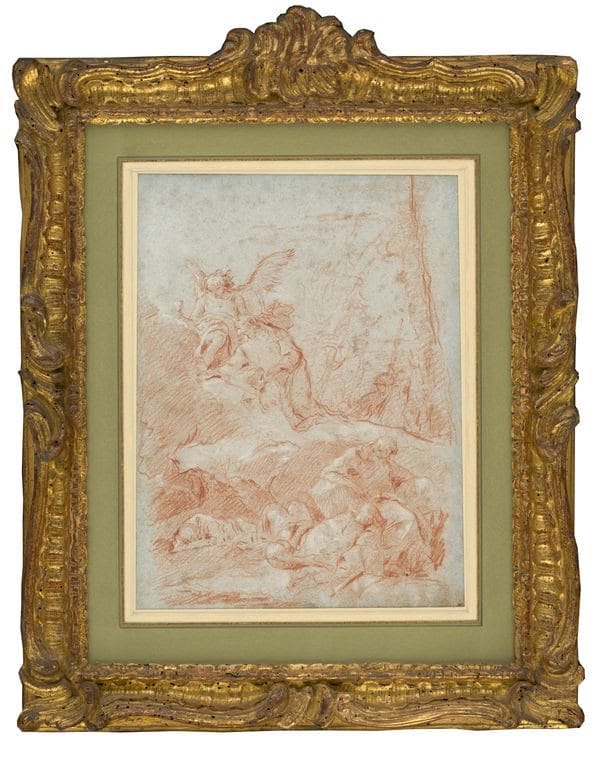NEW YORK – Visions in Blue: Drawings on Blue Paper, an exploration of the techniques and historical context of drawings on blue paper from the 16th to the 19th centuries, will be on view at Christopher Bishop Fine Art in New York City from October 22 through November 13, 2021. The exhibition will be accompanied by an exuberant temporary floral display for the first week, bringing a midsummer’s touch to Manhattan’s autumn art calendar.
Most closely associated with Northern Italian drawings of the 17th century and especially the masters of the Veneto including Veronese, Titian, and Tintoretto, the tradition of drawing on blue paper continued well into the 18th and even the early 19th century. Among the dozen drawings featured in the exhibition is Giovanni Battista Tiepolo’s (Italian, 1696-1770) large-scale drawing Christ in the Garden of Gesthemene, a rare preparatory study for a 1750 painting of the same name by the artist, which is now in the collection of the Marquess of Exeter at Burghley House, Cambridgeshire. Considered one of the greatest painters of 18th century Europe, Tiepolo is known for his frescos in Italy, Germany and Spain. Other notable drawings are by: Jacob Andriaensz Backer (Dutch 1609-1651), Bernardo Strozzi (Italian, 1581-1644), Bartolomeo Cesi (Italian, 1556-1629), and Anna Hoffman (Swiss, born 1622-3).
The gallery will feature a live flower installation inspired by the antique frames on display. Playing off the ephemeral festoons made permanent in these carved works of art, the blossoms render these elements fleeting again. The flowers are expected to last little more than a week, and the best time to the view them will be early in the exhibition.
History of Blue Paper Drawings
Blue paper has long held a special fascination for both artists and collectors, as evidenced by the outpouring of recent publications on the topic and a major conference organized by the Vienna Center for the History of Collecting this summer. Blue paper initially became valuable through an association with such masterworks as the pastels of Federico Barocci and the figure studies of Albrecht Dürer. Ostensibly about creating a neutral ground for pastels and chalk, which would support both highlights and lowlights, the use of this “blue” ground quickly developed into a much more sophisticated signifier. The use of negative space, implying volume and distance, allowed the masters to manipulate this medium to maximum effect. Largely due to the difficulty of these techniques and/or to the scarcity and expense of this paper, the use of blue paper came to signify a high level of sophistication and mastery. The desire to own a work on blue paper has never receded, as contemporary auction records reveal.
The evolution of blue paper as a practical and also a prestigious item tracks the history of paper itself. When paper was hand-made in batches with indigo dye, each piece of blue paper was unique and luxurious. Fugitive vegetable dyes were sometimes used, giving the paper a green, or even gray, tinge over time. When industrial methods were introduced, dyes became more consistent, but quite different in feel and less unique. The use of blue paper diminished with the introduction of mass-produced paper in the late 18th century.
Visions in Blue: Drawings on Blue Paper will be exhibited at Christopher Bishop Fine Art, 1046 Madison Avenue in New York, from October 22 through November 13, 2021.
About Christopher Bishop Fine Art
Christopher Bishop Fine Art specializes in drawings from the 15th through early 20th century. Known for a scholarly approach to evaluating, presenting, and authenticating Old Master works as well as a wide range of works on paper, the gallery seeks to present new ways to think about and collect Old Masters and modern works on paper. Located at 1046 Madison Avenue at East 80th Street, the gallery participates in Master Drawings New York; The Salon du Dessin, Paris; and October Art Week, New York. More information is available at christopherbishopfineart.com.
Drawings on Blue Paper | 16th-19th Centuries | Christopher Bishop Fine Art

Leave a Comment







